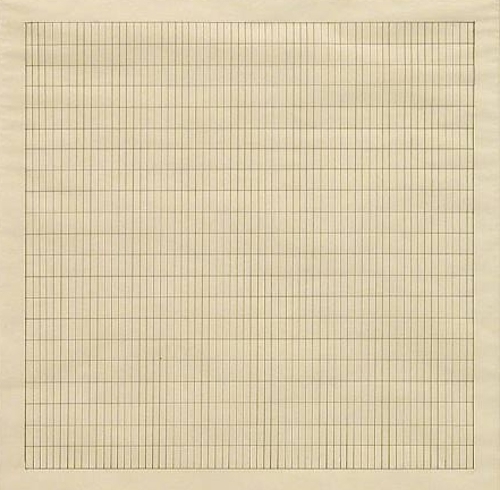
This morning began in a hazed, white ambivalence suffusing all the space between my eyes and my I. Few thoughts, but many dots of motion, interventions of narrative, insects missing their wings; contaminations of the glare, hard to follow. It is a day of liver reaction, the Hep C flaring its intolerance to something I ate, some accrual of too many days of stress.
Looking for a book, Agnes Martin’s Writings, in the over-stacked bookshelf beside my desk, I knock them all down, some landing on my desk to knock over the two stacks beside my laptop as well. Here is the page that opens to me in the first one I pick it up, theory of prepositions, by Claude Royet-Journoud. It is a narrow little book that I used to open often, but it’s been hiding in the stack for a long time. On the page that opens to me are these three lines set in their own blankness:
faced with the nature of the crime
a simulacrum depletes the soil
As if this were a command to choose the white glare, to invoke and act from the overwhelm, as awe.
Agnes Martin is here. The book I’d wanted, been looking for, is obvious now in the tumble on the floor: gray cover; simple type, black and white photo of Martin in the early ‘60s sitting in front of a painting of hers, which is one of her grid structures, which she’s called “objectless,” “a world without interruption,” a breaking down of all form. I remember a phrase describing her work—“as if seen from no vantage at all”… On the back of this book: “We have been very strenuously conditioned against solitude. To be alone is considered to be a grievous and dangerous condition.” It strikes me that I have conditioned myself against, not solitude, but to resist this haze, been frightened of its dazzle, its disruption of position, of vantage. I let the book open at random to: “I’d like to talk about the perfection underlying life when mind is covered over with perfection… [and] how it functions [which] is mysterious to us and unavailable.” The perfection of this morning’s glare, I might simply consider it “dazzle,” nothing I can usefully quantify, make figurative, yet it is functioning, a sweeping perfection that covers mind as I understand it.
And so I will read Royet-Journoud’s “dazzle” as not only verb, as command, but as a noun, and feel the page’s white space as its appositive, its example. And I am brought into immediate relation with the impact of language upon a page. I remember being a child and seeing my mother standing at the kitchen bar and reading the newspaper. I remember how inexplicable it seemed to me then, that printed type could speak to her—that my head hurt a little to try to understand how this could be so, that an object contained voices which were only alive to someone who could read; that early dazzle sifting back to me now, from so many years ago. But the few lines of Royet-Journoud’s poem give me more, suggesting the difficulties in attempting to be “faced with the nature of the crime.”
A little shock, yes a dazzle, to call it a crime: language forever only a double, standing in for pure experience, which can never be held, only made into “simulacra.” And I can’t help but think of what my plan had been for this morning, to make meaning of the mayhem of my life in words of a poem that failed me. But the focus is on the “nature” of this crime, which is its constitution, its organic essence, and goes beyond writing, and includes any thought conceived in language: the impossibility to avoid committing this crime and remain consciously human, the crime seems implicit in its nature, in our nature.
I hear Martin again, “I’d like to talk about the perfection underlying life when mind is covered over with perfection… [and] how it functions [which] is mysterious to us and unavailable.” I think of the perfection of my crime… its way of covering my mind in its perfection…
But Royet-Journoud’s poem isn’t finished with me. I’m thinking of the fact that “soil,” when it is being “deplete[d],” would have had something growing from it and being nourished, in this case “the simulacrum”—a consideration that asks me to read the last line as paradox and as oppositional simultaneity: as rebuking the use of ‘image’ or ‘representation’ for its depletion of “the soil,” as well as simply allowing that any interpretation I make, any representation of the real, must be fed directly by the real, which gives its life to it.
If the phrase “nature of the crime” suggests the inevitable error in any act of representation, then this is not only a query into “the nature” or ‘type’ of crime but also into “nature” as the lost ‘actual’, which representation cannot hold, but that nonetheless succeeds in bringing our failure to mind, as we are faced with the crime of representation. And, since every act of language is an act of representation, this is a necessary rebalancing, since “how it functions is mysterious to us and unavailable.”
Poet, critic, and publisher Rusty Morrison was a teacher for 19 years before earning her MFA from Saint…
Read Full Biography

